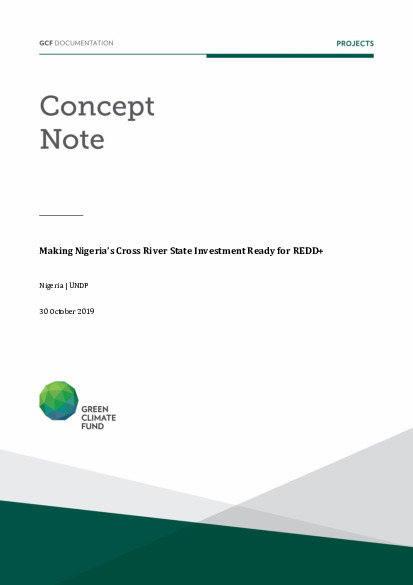Making Nigeria’s Cross River State Investment Ready for REDD+
Cross River State (CRS) which contains 50% of Nigeria’s forests has made significant strides towards REDD+ readiness and is unique in its clear sub-national approach to REDD+. The State has developed (1) a CRS REDD+ Strategy; (2) submitted a sub-national forest reference emission level (FREL) to the UNFCCC, (3) and established a sub-national approach to safeguards. This proposal aims to simultaneously complete and operationalize the Warsaw Components of REDD+ in order to seek result based payments and catalyze private finance for sustainable community forest management and low emissions land-use practices which will deliver carbon emissions reductions at this jurisdictional scale (sub- national level). The project will be led by the Cross River State Government through a multistakeholder, participatory approach to forest, agricultureand land use in community forests, forest reserves and farmlands.
The project will have two components: firstly, activities will focus on supporting future access to REDD+ results-based payments from both market and non-markets sources through improving land use change monitoring and reporting capability, improving safeguards implementation capacity, as well creating a framework and readiness for market transactions by adopting appropriate regulations, setting up a registry and operationalizing a nested approach for REDD+. Implementing partners will include the Ministry of Climate Change and Forestry/ CRS Forestry Commission, the National REDD+ Secretariat/Federal Ministry of Environment.
Secondly, GCF financing will serve to create enabling conditions and mechanisms for low emission rural development through structuring of strong investible institutional entities of forest right-holders who will develop/strengthen forest investment plans and farmer groups for agricultural production. The project will create partnerships, establish value chains and attract investors suitable for this scale of operation with the engagement of the Nigeria Incentive-Based Risk Sharing System for Agricultural Lending (NIRSAL) as the executing entity. These arrangements,trialled and set up by the time the project ends will result access to finance to enable improved agricultural and forest practices that would provide a win–win for livelihoods and climate change mitigation.
